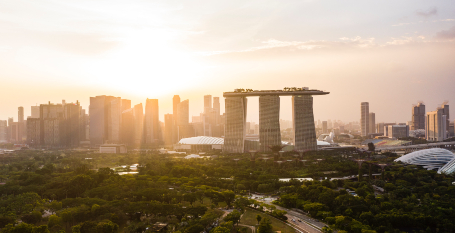Public discussion on a colonial-era law that criminalises sex between men is gaining momentum in Singapore, where a senior minister said any easing would ensure the current definition of marriage is protected.
While the government is reviewing the regulation, “at the same time we are considering how can we safeguard the current legal position on marriage from being challenged in the courts,” Law and Home Affairs Minister K. Shanmugam said in a Facebook video clip posted on the weekend. “We are now considering how best to achieve this balance.”
Several attempts to overturn the legal ban on sex between men - known as Section 377A of the Penal Code - have failed in courts over the years.
A 2014 court challenge against 377A failed when Singapore’s Supreme Court ruled it was a constitutional matter. In February, the Court of Appeal upheld a lower court’s decision to dismiss three challenges to Section 377A, Channel NewsAsia reported. The law has not been actively enforced for over a decade.
The colonial-era law reflected Singapore’s conservative stance toward the LGBTQ community, and any discussion of changing it in the past has drawn resistance from religious groups.
Why is homosexuality illegal in Singapore?
By taking advantage of regional instability and a power struggle within the Malaysian Sultanate, the British government colonised Singapore in 1819.
British control of the island included the introduction of the British legal system, which – at that time – included laws against sex between men.
Singapore became independent in 1965, but the colonial legal system remain in place.
Following a review of the Penal Code in 1938, the laws that policed sexual activity were documented within Section 377A of Singapore’s Penal Code. The laws meant that anal sex and oral sex were prohibited for everyone – heterosexual or homosexual. In 2007, amendments to the law specifically legalised anal sex and oral sex for heterosexual sexual encounters, but they remained criminalised for man-on-man sexual encounters. Sex between women isn’t covered by Section 377A and doesn’t appear to have ever been explicitly prohibited in Singapore law.
The punishment for sex between men is two years’ imprisonment. Prosecutions and convictions are rare, but the government has consistently resisted calls for the law to be reviewed.
Research into the archives of the British Government has shed some light on why Section 377A was enacted. A 1940 report to the British Government official responsible for the administration of Singapore reveals a direct link between the enactment of Section 377A and the colonial administration’s concerns about its Singapore officials’ extensive use of male prostitutes at that time. The 1940 report details disciplinary action taken against government officials in 1938 – the year that Section 377A came into effect. This suggests that Section 377A was designed to regulate and control prostitution rather than what was happening in private between consenting adults, but the reality of this law has been the criminalisation of gay men.












 列印版本
列印版本

















讀者回應
搶先發表第一個回應吧!
請先登入再使用此功能。